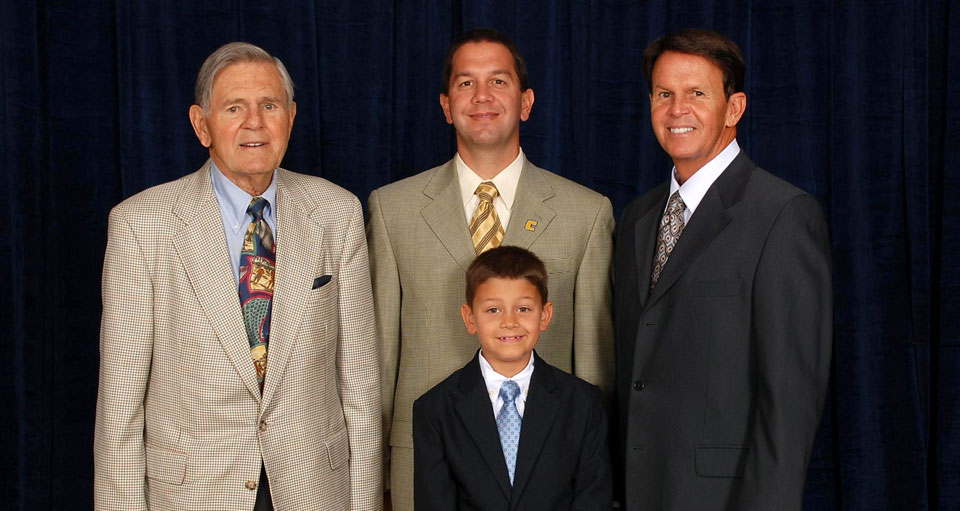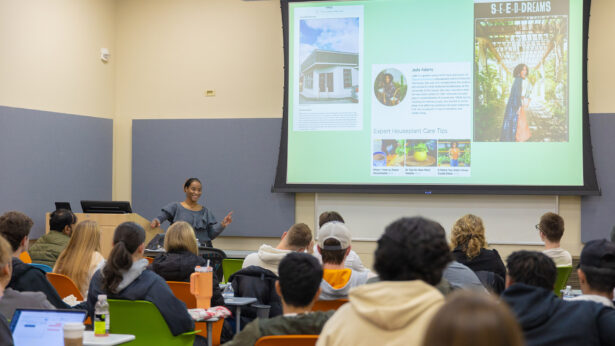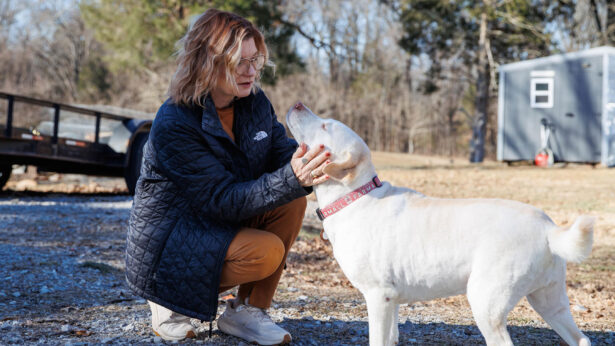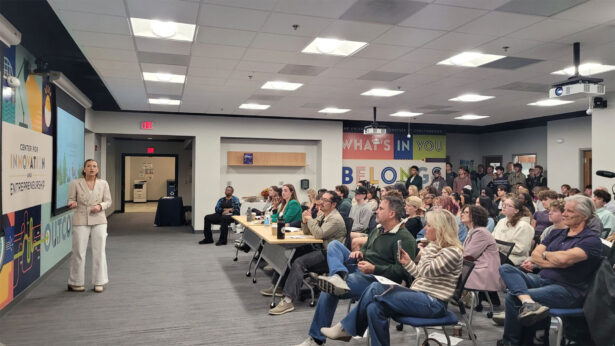By Elizabeth A. Davis
Father, son and grandson follow careers in athletics
UT Knoxville athletics director Dave Hart thought he wanted to be a college basketball coach. Maybe that outcome would have made an interesting story. Fathers and sons in coaching? We’ve seen it before. Here’s something better. The Hart family includes three generations of athletics administrators.
Still not convinced? This family is so competitive they have pingpong tournaments complete with seeding and brackets. And don’t even consider making small talk while watching a game with one of them. They may not show it, but their blood pressure will skyrocket.
Hart’s father, Dave Sr., coached football before he was athletic director at Louisville and Missouri and commissioner of the Southern Conference. Dave Jr. now has nearly 30 years of experience as an administrator, including the past eight months as vice chancellor and director of athletics at UT Knoxville. Hart’s son, Rick, has been athletic director at the University of Tennessee at Chattanooga since 2006.
How did Dave Sr.’s son and grandson end up as athletic directors? They might say it’s just in the DNA.
Path to administration
After playing basketball at Alabama under coach C.M. Newton, Dave Jr. stayed on campus to earn his master’s degree and work as a graduate assistant with the team. Coach Newton suggested that, if he indeed wanted a career in coaching, he should try his hand in the high school arena first.
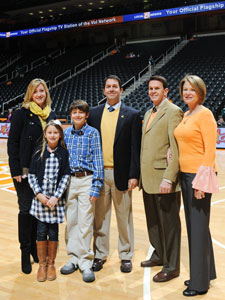 So at 23, he and his wife, Pam, and baby son, Rick, left Tuscaloosa. He spent the next 10 years coaching boys’ high school basketball and teaching English and speech in Pennsylvania and Kentucky. His teams at first played in front of very small audiences, but with a combination of winning and basic marketing ingenuity, the number of fans began to grow.
So at 23, he and his wife, Pam, and baby son, Rick, left Tuscaloosa. He spent the next 10 years coaching boys’ high school basketball and teaching English and speech in Pennsylvania and Kentucky. His teams at first played in front of very small audiences, but with a combination of winning and basic marketing ingenuity, the number of fans began to grow.
By the early 1980s, the idea of sports marketing was taking root in college athletic programs. Many schools were just starting to hire people specifically tasked with marketing. East Carolina University was such a school. Then-athletic director Ken Karr attended a national seminar where Hart was speaking about his experiences in marketing at the high-school level.
“He asked me if I ever considered going into athletics administration. I hadn’t. I thought I wanted to continue coaching and maybe move into college coaching,” Dave Jr. recalls. “But he asked me to come to look at East Carolina. He said he was creating a position for assistant AD in athletics marketing. I didn’t say this at the time, but I didn’t know if East Carolina was in North Carolina or South Carolina.”
It seemed like a good opportunity, and Dave Jr. was excited. So, like many sons and daughters, he sought counsel from his father about what he should do. But his father, Dave Sr., had a little more insight than most parents would.
Deep Roots
When Dave Jr. was growing up, his father was a very successful high school football coach in Pennsylvania. While he coached Greater Johnstown High School, the team posted a 27-game undefeated streak that included the 1958 Western Pennsylvania Interscholastic Athletic League title. Dave Sr., who died in 2009, was posthumously honored in 2010 with the high school’s John P. Murtha Friend in Education Award. Dave Jr. accepted the award for his father.
“Certainly, as I went into coaching and ultimately administration, I was really fortunate I had an unbelievable sounding board, and I capitalized on that.”In 1962, Dave Sr. jumped to the college ranks, moving to the University of Kentucky to coach defensive backs. Next, the family moved to Annapolis, Md., where Dave Sr. was an assistant at Navy. He was named head coach at Pittsburgh in 1966.
Dave Sr. then made the transition to administration. He became Louisville’s athletic director in 1973. He was athletic director at Missouri when Dave Jr. was offered a job at East Carolina in 1983.
“I told him I’d have to take a pay cut, and he said, ‘Listen, that’s life. Sometimes you have to take a step back to take two steps forward later on,’” Dave Jr. says. “He said that’s what people do. So I did it. It certainly was good advice.”
Now father and son could talk shop – athletic director style.
“Certainly, as I went into coaching and ultimately administration, I was really fortunate I had an unbelievable sounding board, and I capitalized on that,” he said.
A Steep Learning Curve
Going from high school coach and teacher to college athletics administration was a big leap. “I was on a pretty steep learning curve,” he says. “I remember calling my father and saying, ‘I just came out of a meeting, and I’m not even sure what they were talking about.’”
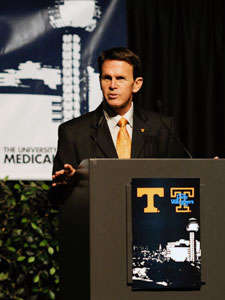 “Eventually (athletic director Ken Karr) entrusted me with everything external: radio, TV, sports information, marketing and development.”
“Eventually (athletic director Ken Karr) entrusted me with everything external: radio, TV, sports information, marketing and development.”
When Karr retired in 1987, Hart was promoted to athletic director. In all, Hart and his family spent 12 years in Greenville, N.C. The Harts and their three children – Rick and daughters Jamie and Kelly – were happy in Greenville. Because of the number of times Dave Jr. moved as a boy, he decided to keep the family in one place until the children finished high school.
“Once our kids got in high school, I told them that, unless it was a very unusual set of circumstances, they were going to finish high school here. We had a lot of opportunities, but we didn’t go,” he says. “I never felt I needed to go to the next step. That has never driven me.”
But in what circumstances would Dave Jr. consider leaving? He made a list of five schools he would pursue if approached: Florida State, Alabama, Georgia, North Carolina and – you guessed it – Tennessee.
“We got the call that year from Florida State,” he says. So, in 1995, they went to Tallahassee.
Like father, like son
Rick Hart’s early childhood was similar to his father’s. They both hung around the gym or football field where their fathers coached, observing and learning. They were surrounded by athletics.
Rick and Dave Jr. will tell you there are some differences. They don’t look exactly alike for one thing, but it’s clear from meeting them in person they are related. They have a presence like a point guard, making sure everyone is in the right place and passing the ball at the precise moment so a teammate has a clear path to the basket. You know they are in charge.
They are both well-dressed. Dave Jr.’s neatness extends to workout attire.
“Dad is particular about clothes being pressed. I iron what needs to be ironed, and that’s it. He irons everything, and probably that’s not an exaggeration. Everything,” Rick divulges. “He’s been known to iron sweat suits.”
“Sometimes I’ll have to play my (9-year-old) daughter, and that’s too bad. She can work her way out of the loser’s bracket.”“I don’t think I’m quite as Type A as he is,” Rick says. “I don’t think I’ll ever send out an itinerary for a family vacation, which happens when we vacation with them.”
What is on this itinerary? “Day by day, when we’re to get up and meet, activities throughout the day, which ones are mandatory and which are optional, which days are free days, attire, pack lists, the whole deal,” Rick says. “I like to plan so we maximize the experience, but we don’t do that in our family.”
The competitiveness may have mellowed a little as it was handed down from generation to generation, but it’s hard to gauge. About this family pingpong tournament: “We bracket and seed everybody. You don’t let people win, either. Sometimes I’ll have to play my (9-year-old) daughter, and that’s too bad. She can work her way out of the loser’s bracket,” Rick says. “I think it’s fun, but it can get a little ridiculous.”
“Intense” is how Dave describes himself while watching a game. “Pam lives with it because she knows it’s in my DNA,” Dave says. But some people he’s attended games with aren’t like that.
“We would be in a championship game driving to take the lead, and I’d have somebody come up to me and say, ‘Dave, Gate C takes like 20 minutes to get people through the gate. Have you ever thought about that?’ And I’m like, ‘Not at this moment.’”
Once, during a crucial drive in a bowl game, someone asked Dave, “Do you know where the M&Ms went?”
“You just have to grit your teeth,” Dave says and responds to the question, “I don’t know where the M&Ms went.”
“Our daughter was at that game, and after that person was out of earshot, she turned to (his wife) Pam and said, ‘He’s going to blow!’”
Rick’s journey
Rick Hart went to college at the University of North Carolina at Chapel Hill and during the summers returned to Greenville to work in “operations” at East Carolina.
“In other words, I worked outside. I had an hourly wage,” he says. The work consisted of lining the practice field, painting locker rooms and other sorts of manual labor.
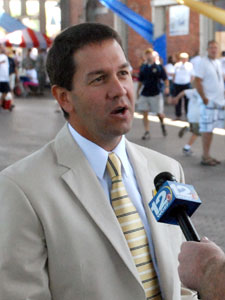 He graduated from UNC in 1994, a year before his parents moved to Florida. While still in school, he approached his father and grandfather about possibly pursuing a career in athletics.
He graduated from UNC in 1994, a year before his parents moved to Florida. While still in school, he approached his father and grandfather about possibly pursuing a career in athletics.
“They tried to talk me out of it, probably to make sure, in hindsight, I knew what I was getting into,” he says.
His father and grandfather suggested he talk to John Swofford, who is now commissioner of the Atlantic Coast Conference and was athletic director at UNC at the time. He helped Rick develop an internship program within the athletic department where he could rotate in various operations such as ticketing, academic support and the business office. Upon graduation, he transitioned into a full-time job in the ticket office.
Unlike his father and grandfather, Rick skipped the coach-to-athletic-director path and went straight to administration. Even though he stood to be the third athletic administrator in his family, he didn’t immediately aspire to it.
“It took me until my junior year in college to come to the realization that was a possibility as a career choice,” Rick says. “When I started to pay more attention to the job and the purpose behind it, that’s when I became inspired. I started to pick up on the fact that they were making a difference, that it is meaningful to a lot of people.”
You may be starting to see a pattern here
Rick and his wife, Allison, were happy living and working in Chapel Hill until one day he got a call from Joe Castiglione, athletic director at Oklahoma, to see if he was interested in heading the Sooners’ marketing department. Rick did not personally know Castiglione, but he had worked for Dave Sr. at Missouri.
Allison was pregnant with their first child, and they were leery of moving so far away from their families in North Carolina and Florida. Despite that, they decided to visit Norman, Okla.
Their timing couldn’t have been worse. The visit coincided with what the National Weather Service has dubbed “The Great Plains Tornado Outbreak of May 3-4, 1999,” in which more than 70 tornadoes caused $1.2 billion in damage. Forty people in Oklahoma were killed.
When the tornado warning sounded, Rick and Allison tried to play it cool in their hotel room. Eventually the hotel guests were evacuated to a downstairs room, where they watched TV and listened to the radio until the power went out. All telephone and cell service went out, so they left Norman the next day without saying good-bye to Castiglione.
“It wasn’t until we got back to Chapel Hill that we talked to Joe. His first question was, ‘Are you still coming?’ I said, ‘You’re going to have to give me a little time to work on that,’” Rick recalls.
But, in the end, Rick and Allison were not deterred. Both of their children, Trevor and Caroline, were born in Norman. In all, he spent seven years at Oklahoma, eventually rising to senior associate athletic director in 2006.
All aboard to Chattanooga
During Rick’s stint at Oklahoma, he found a great mentor in Castiglione, who often mentioned jobs he could pursue at other schools.
“One day he approached me and said, ‘Look, I know you haven’t looked at a lot of FCS (formerly I-AA) schools, but there’s one I just got a call about in Chattanooga, and I think it might be a great opportunity,’” Rick says.
He talked to his father and grandfather about the job and was convinced it was a great opportunity. By this time, Dave Sr. was retired from the Southern Conference and living in Asheville, N.C., where he did some athletic consulting for UNC-Asheville.
“I run into people I don’t know who have been part of the conference, and they’ll come up to me and mention their interactions and experiences with my grandfather. It keeps him present.”“His knowledge of the Southern Conference and UTC was invaluable. He told me this was one of the hidden gems of the country,” Rick says.
“I run into people I don’t know who have been part of the conference – like an official, coach, former coach – and they’ll come up to me and mention their interactions and experiences with my grandfather. It’s neat that can continue to happen. It keeps him present.”
So how much longer does Rick plan to stay at UTC? He gets asked that question all the time. The answer: He doesn’t know.
“I still feel like I’m making a difference. We still have a lot of work to do, but we are very focused on what we’re doing now. That’s a great position to be in,” he says. “I’ve seen other people do it differently. You can’t do your best work if you’re not 100 percent committed to the place you are.”
Rick’s father and grandfather envisioned a great future for him.
“My Dad said it, and I agree. Rick is the best one. He is. Rick gets it. He is extraordinarily bright. He understands all the elements of athletics and cares about people and has good core values,” a proud Dave Jr. says. “He’ll far surpass the two of us well before his career ends.”
Pap Paw comes to Tennessee
Dave’s tenure at Florida State spanned 13 years. During that time, the school raised more than $100 million for athletics facilities, and the Seminoles won 35 Atlantic Coast Conference titles in 10 sports and played for four football national championships – and won one.
In 2008, he was presented with the James J. Corbett Memorial Award, the highest honor given by the National Association of Collegiate Directors of Athletics. The same year he returned to his alma mater to serve as executive director of athletics.
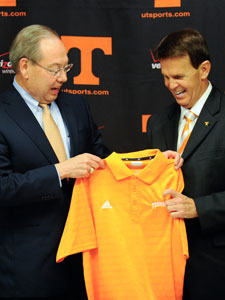 “I had two goals at Alabama, help (athletic director) Mal Moore, one of the finest individuals I know, and make a difference at my alma mater,” Dave says.
“I had two goals at Alabama, help (athletic director) Mal Moore, one of the finest individuals I know, and make a difference at my alma mater,” Dave says.
Pam is a native of Tuscaloosa, and they could have stayed there until Dave decided to retire. But he was approached again by another school on his list. UT Knoxville came to call in August 2011, but he wasn’t immediately interested. When it became obvious the university targeted him for the position, he was hooked.
“People here have been wonderful. We very much feel a part of the Tennessee family,” says Dave, a recipient of the Robert R. Neyland Award, named for the former UT coach.
“Once they decided going to Knoxville was best for them, then I was happy for them and happy for UT because I have a strong belief and he has a track record that he’ll make that program better,” Rick says. “That will benefit our entire state and our program.”
Now the Harts, their children and grandchildren are within a three-state region – Tennessee, North Carolina and South Carolina – and they enjoy spending time with each other and at their university homes. Maybe there’s a fourth generation athletic director in the making.
“They love being a part of the athletic family – the atmosphere, the games,” Dave says about his children. “As they grow, the focus changes from Smokey to what the defensive end did on a particular play. They love the environment and being around athletics.”
Must be in the DNA.
We’ve Got Spirit, How About You?
Dave Hart’s office contains photos and sports memorabilia, including a football signed by Phillip Fulmer and Bobby Bowden from the 1998 national championship game between Tennessee and Florida State.
“I was on the sideline when Tennessee won the national championship. I was just on the other sideline,” says Hart, who was Florida State athletic director from 1995 to 2007. “I was crushed when Tennessee was elated on that particular night because I represented Florida State, but now I represent Tennessee. I know people have a hard time grasping this.”
For alumni and fans, it may be difficult to understand how coaches or athletic administrators can switch allegiances so quickly when they arrive on a new campus, particularly if it’s a rival of either the last school where they worked or their own alma mater or both.
In Dave’s case, it’s both. He’s an Alabama graduate and last worked at Alabama before arriving at UT Knoxville last fall.
“Once you become part of that family, that’s where your passion immediately transfers. It doesn’t mean you don’t appreciate and will forever appreciate your years spent at other institutions.”“Once you become part of that family, that’s where your passion immediately transfers. It doesn’t mean you don’t appreciate and will forever appreciate your years spent at other institutions,” he says. “Obviously, when I came here I anticipated the question and tried to address that because of the rivalry between these two institutions and history, which I’ve followed for years and years.”
Rick Hart left his alma mater, North Carolina, to work at Oklahoma and then came to UT Chattanooga in 2006. He says the connection with the new school is through its people.
“I understand the question, but it’s people. Now you’re serving the people here, and that’s who your allegiance is to, and that’s who you’re responsible for,” Rick says. “So, in a very professional way, you do it. It probably takes a little longer for the family to get into the ‘we’ mode because they don’t get to know the people as quickly.”
Dave’s younger brother, Dick, who played football at West Virginia, already has a new orange wardrobe. He came to a football game last season soon after Dave was named athletic director.
“He called me, and he said, ‘Dave, look, you’ve been there 10 days, and I don’t have anything orange,’” Dave says. “He’s all Tennessee now.”
One of Dave’s newest photos in his office is his daughter Jamie’s two girls, McKinley and Olivia, dressed in orange outfits. Press a button, and the two sing “Rocky Top.” Young grandson Kingsley, son of daughter Kelly, has Smokey pajamas.
Son Rick’s children are divided about their loyalties to their grandfather’s new school.
“My daughter (who wears orange and white rubber bands on her braces) jumped on board quickly. My son has been a little reluctant,” Rick says. “The first thing my son said was, ‘I’m happy for Pap Paw. He’ll do a good job. He and Gram are happy. But I can’t wear orange.’”
Of all the schools the Harts have been associated with, several rival schools have been orange-clad. For instance, Oklahoma’s rivals are Texas and Oklahoma State.
So you can see Trevor’s dilemma. “He’s coming around,” Rick says. “He’s 12.”
In Their Words
What are the three most important tasks you do as athletic director?
Dave Hart:
1. Lead and not just manage.
2. Assess and evaluate things for what they are.
3. Develop relationships and trust.
Rick Hart:
1. Set a clear vision, standards and clearly defined roles.
2. Have a consistent approach across department and constituent groups and model those behaviors and characteristics that we’ve defined for our program.
3. Make sure people are accountable but also supported.
What did you learn from your father that helps you in your current job?
Dave Hart:
I learned about work ethic and much, much more. One of the things I took away is, “If you don’t have class, you don’t have much of anything.”
Rick Hart:
What they showed me was you can have success and be true to your values, and the two aren’t mutually exclusive. That’s how I’ve tried to lead and manage throughout my career. That is what has inspired me to continue in this business.
